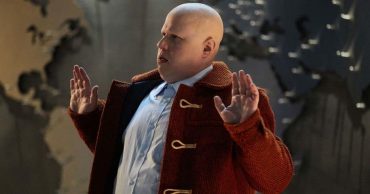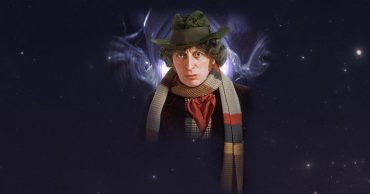 Doctor Who giveth and taketh away.
Doctor Who giveth and taketh away.
Last week’s “Rings Of Arhaten” gave us spectacular visuals, entertaining alien crowds and great banter between The Doctor and Clara, his new companion.
What is lacked was a comprehensible script, a sense of the stakes and a clear antagonist.
This week, we got all of the latter and some of the former, in Mark Gattiss’ “Cold War,” a tightly contained drama in which a Martian Ice Warrior, thawed after a Captain-America like deep freeze, wrecks havoc aboard a Russian nuclear submarine during the cold war (get it?).
What ensues is an episode that has elements of Aliens, the Hunt for Red October and various Halloween movies as an unrelenting villain stalks a crew of frightened Russian sailors through the dark and dreary corridors of a sunken submarine.
When the Russians react to the armored Martian with violence, The Doctor is at his finest when pointing out that the Ice Warrior in not a mindless animal. The Doctor insists the alien is an honored member of his military, albeit from a different species. He invites the Ice Warrior to introduce himself by name. We feel the Martian’s pain as he explains his belief that he’s the last of his race, destined to die alone among strangers long after all his loved ones have passed on from this – or any other -world.
Sadly, the trigger-happy Russians respond with violence. It’s a fight they may lose. If they do, the stakes are high – the Russians are piloting a nuclear submarine. One launched missile will start World War Three.
If there’s one thing The Doctor hates, it’s war, and militaristic races that promote it. Therefore, it’s a little off-putting that he’s so quick to insist the Martian deserves respect because he’s a soldier. Perhaps he’s trying to encourage rapport – if the humans see the Ice Warrior as not-so-different than themselves, perhaps the violence won’t escalate. HIs optimism doesn’t last long, though, as the humans electrocute and then imprison the creature, precipitating a rise in tension that mirrors the real events of the cold war. It’s a clever plot that provided some teachable moments as I explained to my sons that there really were cold wars, arms build-ups and a belief in mutually assured destruction.
The Russians were fairly generic red shirts. The Captain was stalwart, his first Lieutenant ambitious and treacherous. The wacky scientific consultant, wryly played by the engaging David Warner, seemed a lot more interesting than the script gave him time to show. In his few, short scenes, he had some intriguing conversations with Clara,who confessed the nerves and panic she must have been experiencing. This was a refreshing change from past companions, who met all kinds of aliens in life-threatening circumstances that one would imagine merit a bit more freaking-out than they ever showed.
Put a monster on a submarine and guess what’s next? The plot progressed exactly as you’d imagine, with few surprises. The Ice Warrior was determined to launch the sub’s missiles, under the sensible assumption that since his species is extinct, why shouldn’t humans be, too? At this point, The Doctor lost his s**t, as he threatened to blow up the submarine rather than let the alien release nuclear torpedoes. For the first time, The Doctor’s sonic screwdriver glowed red instead of the usual green. Holy crap! Is that self-destruct option? Set phaser to kill? Matt Smith’s acting convinced you he’d sacrifice himself, Clara and the crew to prevent a nuclear Armageddon.
At the critical moment though, fate intervenes to save the day. In this case, the deus ex machina was a literal machine from the sky – a massive Martian spaceship arriving to rescue their lost soldier. The Ice Warrior, knowing his race survived on, returns control of the missiles to the humans, and the episode ends in a chuckle as The Doctor reveals his pesky TARDIS rematerialized half a world away.
The TARDIS’s fleeing the ship was strange thing. Earlier in the episode, the iconic phone booth dematerialized from the sub. The Doctor explained it as a glitch in a modification he’d been making to the ship’s Hostile Action Displacement System (H.A.D.S.). I’m not sure why the episode went out of its way to point this out – its not as if Clara and The Doctor would have used it to escape the conflict even if the TARDIS remained. My guess is the H.A.D.S. will prove relevant later in the season, perhaps when the TARDIS isn’t around at a point they really need it.
The Martian spaceship looked great hovering above the submarine in an episode otherwise light on otherworldly special effects. Also light was any progress in The Doctor/Clara relationship. Despite a few fun exchanges, their partnership wasn’t advanced. For the first time since her appearance as a Dalek, Clara wasn’t a caretaker for a child. Instead, she showed a little more vulnerability and fragility than we’re used to seeing in the age of superwomen like Donna and Amy. Her reactions were endearing.
Unlike past episodes, when the Doctor seemed more interested- even attracted – to Clara than he usually is to companions, he’s clearly uncomfortable at the end of this episode, when she gives him a celebratory hug. I’m not sure where these two are going.
In the end, “Cold War” was an entertaining, if fairly standard, romp. I enjoyed it. It was creepy but not scary, well-acted but without any standout performances (besides that of the under-used Mr. Warner, who seemed like he’d wandered in from a more interesting episode). I still think the show is treading water until they tell the stories that center more on Clara’s many mysteries. It was the kind of good but not great episode that keeps you hanging on for the knockout punch you know is coming.
 Follow Us
Follow Us





